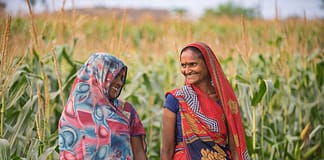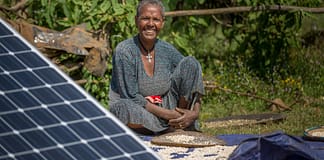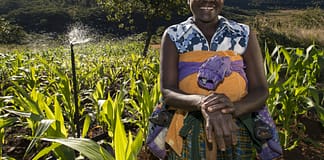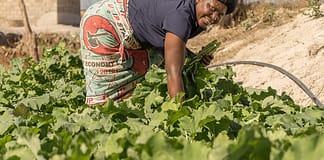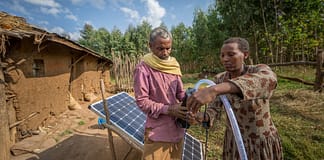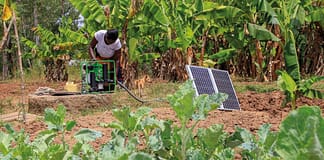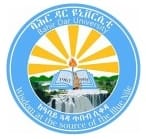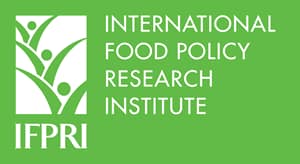Farmer-led Irrigation
Smallholder farmers produce more than a third of the global food supply but face challenges such as increasing competition for water, unpredictable rainfall, limited financial capacity and restrictive gender norms. Farmer-led irrigation has significant potential to support agricultural transformation and adaptation to climate change by enabling farmers to produce greater quantities of high-value crops in areas with rainfall variability. Built on the belief that farmers should have agency and autonomy over decision-making related to irrigation, farmer-led irrigation is a process where farmers invest in, expand or improve their agricultural water use by adopting or developing small-scale, locally relevant and market-oriented solutions.
IWMI’s research on farmer-led irrigation focuses on six areas. These aim to influence policy, strengthen irrigation markets, services and value chains, test innovation bundles using renewable energy such as solar and accelerate farmer-led irrigation development in an inclusive and sustainable way. All the focus areas contribute to the broader ambitions of a unified One CGIAR. These are defined by ways to grow, catch, trade and consume healthy and nutritious food while helping the world to live within planetary boundaries, stop the loss of biodiversity and maintain a safe climate.
Click on the icons on the right to find out more or browse the resources below.
Highlights

Environmental Research Letters, 2024
More... [DOI] | Fulltext (2.97 MB)

2024
More... | Fulltext

2024
More... [DOI] | Fulltext (2.66 MB)

2024
More... | Fulltext (2.33 MB)

2024
More... | Fulltext (2.33 MB)

Energy Strategy Reviews, 2024
More... [DOI] | Fulltext (884 KB)
Potential for Solar Photovoltaic-based Irrigation
An interactive online tool to identify suitable areas for solar-based irrigation depending on water sources, soil and land characteristics, market proxies and pump characteristics across sub-Saharan Africa. The solar suitability mapping framework was developed using a GIS-based multi-criteria evaluation technique and implemented by combining spatial information from a number of geospatial drivers for solar-based irrigation.
Analyzing the Enabling Environment to Enhance the Scaling of Irrigation and Water Management Technologies: A Tool for Implementers
Designing scaling strategies that are adaptive to context and available resources requires an understanding of the enabling environment in which the scaling processes are embedded. This can be achieved by conducting an analysis to identify enablers and hinderers influencing farmers’ adoption of irrigation and water management technologies and introducing measures to ensure success. This tool provides implementers with a structured guide to carrying out this analysis.
Considering Gender When Promoting Small-scale Irrigation Technologies
Many actors promoting irrigation technologies in low- and middle-income countries want to ensure that men, women and different social groups have equal opportunity to participate in and benefit from irrigation but are uncertain how to do so. This tool provides a set of questions to assess gender dynamics in irrigation in a specific context.
The Farmer-led Irrigation Development Guide: A What, Why and How-to for Intervention Design
Farmer-led irrigation development (FLID) holds significant potential to safeguard domestic food security and strengthen farmers’ ability to recover from shocks and adapt to a changing environment. The guide aims to provide governments with the practical strategies to catalyze FLID and scale it up, making it a faster, more sustainable and inclusive process.
Water Accounting+
Water accounting integrates hydrological processes with land use, managed water flows and the services that result from water consumption in river basins. Its objective is to achieve equitable and transparent water governance for all users and a sustainable water balance. The Water Accounting+ tool provides independent estimates of water flows, fluxes, stocks, consumption and services.
| Name | Role/expertise | Country | Focus areas |
| Dr. Minh Thai | Innovation system scaling, multistakeholder dialogues, enabling environment, policy | Ghana, Mali, Ethiopia, Zambia | All focus areas except environmental sustainability |
| Dr. Marie Charlotte Buisson | Socioeconomic analysis, agricultural economics | Mali, Ethiopia, Niger, Bangladesh | Innovation bundles, gender and social inclusion |
| Hauke Dahl | Private sector financing | Ghana, Ethiopia, Mali, Zambia | Gender and social inclusion, financing ecosystem |
| Fitsum Hagos | Socioeconomic analysis, agricultural economics | Ethiopia | Financing ecosystem |
| Dr. Mansoor Leh | Water accounting, suitability mapping | Sub-Saharan Africa | Environmental sustainability |
| Dr. Manuel Magombeyi | Hydrology, agricultural water management | Ghana, South Africa, Zambia | Innovation bundles, environmental sustainability |
| Dagmawi Melaku | Enabling environment, multistakeholder dialogues | Ethiopia | Gender and social inclusion, adaptive scaling and partnerships |
| Dr. Aditi Mukherji | Groundwater institutions and policies, climate change | Bangladesh, India, Nepal, Pakistan | Gender and social inclusion, environmental sustainability |
| Likimyelesh Nigussie | Gender expert, institutions | Mali, Ethiopia | Innovation bundles, gender and social inclusion, financing ecosystem |
| Abena Ofosu | Private sector partnerships, innovation grants and scholarships, irrigation supply chains and services | Ghana | Gender and social inclusion, adaptive scaling and partnerships |
| Dr. Paul Pavelic | Groundwater hydrology | Laos, Nepal, India, sub-Saharan Africa | Environmental sustainability |
| Dr. Lisa Maria Rebelo | Remote sensing, water productivity, water accounting | Mali, Ethiopia, Kenya | Environmental sustainability |
| Desalegn Tegegne | Irrigation engineer | Ethiopia | Innovation bundles, adaptive scaling and partnerships |
| Labisha Uprety | Agricultural value chains, irrigation supply chains and services | Nepal | Adaptive scaling and partnerships, financing ecosystem |
| Shilp Verma | Water-energy-food nexus | India | Innovation bundles, environmental sustainability, adaptive scaling and partnerships |
| Dr. Azeem Shah | Solar irrigation bundles | Pakistan | Innovation bundles, environmental sustainability, adaptive scaling and partnerships |
| Dr. Petra Schmitter | Agricultural water management, hydrology | Ethiopia, Tanzania, Ghana, Kenya, Zambia, Mali | Innovation bundles, environmental sustainability, adaptive scaling and partnerships, human capacity development |








